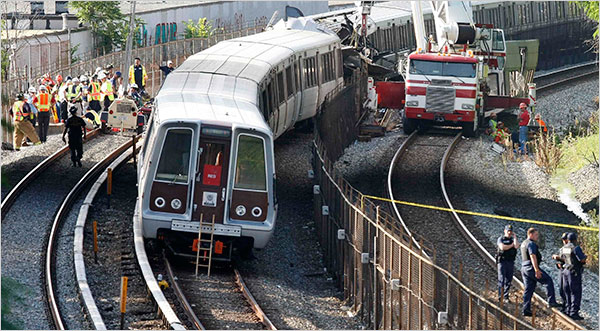Tom McNamara, Blueprint America
 D.C. Metro crash || Photo: Reuters D.C. Metro crash || Photo: Reuters |
On Monday evening in Washington, D.C., as area commuters headed home from work, a Metro train car rear-ended another car — resulting in the deaths of nine, so far, and critically injuring at least two.
Though the cause of the accident is still speculated, especially following two recent rail accidents nationally in the past year — in Los Angeles, where a commuter train collided with a freight train and 25 died, and in Boston, where a trolley rear-ended another trolley and injured 50 — officials said today the Metro train car involved was two months past due for scheduled maintenance on its brakes, and the car was an older model that federal officials had recommended be replaced because of concerns about its safety in a crash.
According to The Washington Post, officials have not said, however, “if they believe that the delayed maintenance played any role in the accident, or if they believe another type of rail car would have performed better in Monday’s crash.”
Still, as investigators are looking at possible mechanical, signal and operator failures for the cause of the accident, which also injured 75, the Metro system – like most mass transit agencies throughout the country – is on the verge of operating in deficit (a shortfall of $154 million is projected for fiscal year 2010 – see map below).
At this point, though funding issues may or may not have been the reason for overdue maintenance and updates to the train car, two U.S. Senators just released a letter to their colleagues asking for $50 million in grants to improve rail safety technology. Commerce Committee Chair Jay Rockefeller (D., WV) and Environment Committee Chair Barbara Boxer (D., CA) noted that a $50 million investment in technology improvement grants was authorized under similar circumstances before — after the Los Angeles commuter rail accident — when Congress passed its rail safety law last year.
According to streetsblog.org, Sens. Rockefeller and Boxer wrote:
More commuters are turning to commuter rail today than ever before. In these tough economic times, with many commuter rail agencies facing budget cuts, funding for the railroad safety technology grants is vital to ensure that important safety measures continue to be implemented.


